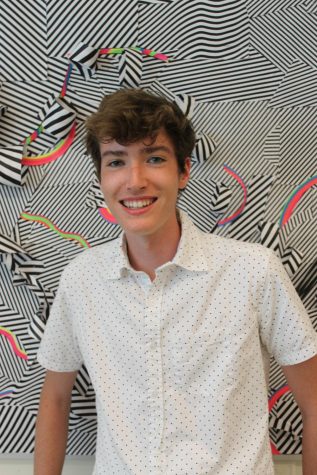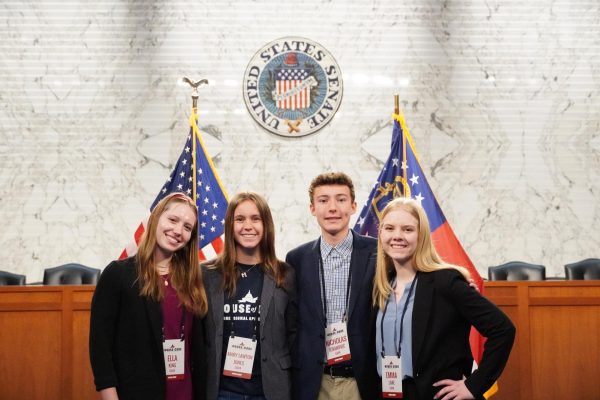FLEX vs. GaVS: Students’ Virtual Options in the Age of COVID
After more than a year of mostly virtual instruction, Chamblee High School is finally back in person. However, the option to stay virtual still exists for students who would prefer not to reenter a packed school building. This includes two primary options: Georgia Virtual School and DeKalb County School District’s FLEX Academy. While both offer virtual-only classes, there is one key distinction.
“The main difference is who runs the program,” said Chamblee High School head counselor Tinikia Jones. “Georgia Virtual School is run by the Georgia Department of Education, and those courses come with a cost of $250 per half a credit, whereas FLEX Academy courses are run by DeKalb County School District and those courses are free.”
Due to this important contrast, students’ motivations for participating in these programs have been different as well.
“Sometimes you’ll have students that just take an extra class […] through FLEX or Georgia Virtual,” said Jones. “So they can come [to school in-person] for seven classes, and if they want to take an extra class, they can take the eighth class online. Most of the time when that happens it’s through Georgia Virtual, though, because kids are taking something, usually, that we don’t offer — some extra AP or something like that, and their parents pay for it.”
With extra time on their hands during last year’s national quarantine, many students took advantage of Georgia Virtual School to do just that.
“I wanted to take summer classes, you know, [because during] COVID I was bored,” said Chamblee senior Sylvia Kat (‘22). “I was like, I’ll do [Georgia Virtual School], I’ll raise my GPA, It’ll be perfect.”
FLEX Academy, on the other hand, is more likely to be used as a strict alternative to an in person school day. In the age of COVID-19, this is particularly relevant.
“FLEX Academy primarily is used for students either who are 100% virtual or for students who have failed a class that need to make it up for graduation,” said Jones. “I want to say there’s less than probably forty [students] that actually selected full time virtual this year. [For] most of them, it’s because either they have health issues, maybe a family member in the house is really seriously immunocompromised or is going through something, and it’s just too risky. Some will [stay virtual] just because of their fears of coming back with this many people, but there was nothing too alarming, everyone that I can recall had very solid reasons [for staying virtual].”
For senior Ayesha Mustafa (‘22), that decision was influenced by her family’s past experience with COVID.
“My whole family had COVID at one point, but we’re good now,” said Mustafa. “The main reason I didn’t go back in person is because I didn’t want to be around a lot of people at school.”
For FLEX students, their connection with Chamblee is similar to that of a full time dual enrollment student, with access to Chamblee High School resources despite taking classes elsewhere.
“Technically they are still enrolled, so they’re still Chamblee students,” said Jones. “So they can still benefit from the services we offer either in counseling or mentoring, or they could attend a game, or whatever they want because they’re still technically Chamblee students, it just means all of their classes are through the FLEX Academy virtual program so they’re not reporting here during the day. They’re still on our rosters for funding and accounting purposes.”
The same cannot be said for students taking all of their classes through Georgia Virtual School, however. This came as a surprise for Kat, who ended up spending the entire 2020-2021 school year doing GaVS.
“I was not enrolled at Chamblee, which I didn’t realize was going to happen,” Kat said. “It definitely would have affected my decision because I couldn’t join any clubs or do anything. So I was not enrolled, […] and I became a homeschool student.”
That’s not to say that staying a virtual student doesn’t have advantages, however. Unlike Chamblee’s virtual program during the 2020-2021 school year, both GaVS and FLEX Academy are asynchronous, which creates schedule flexibility for participating students.
“Whenever I get up in the morning, I just start doing the work,” said Mustafa. “Because [FLEX] doesn’t have any meetings. So it doesn’t matter when I start doing my work.”
Kat experienced the same freedom with Georgia Virtual School. It also gave her the ability to work a part time job that she couldn’t have otherwise.
“I could wake up whenever I wanted,” she said. “I woke up at noon every day and it wasn’t like I was missing classes or anything because it was with Georgia Virtual School. It’s all self guided.”
But just as most Chamblee students experienced last school year, any virtual option certainly has drawbacks. While asynchronous school creates schedule flexibility, it also brings instructional challenges.
“I feel like the main reason my grades are not the best right now is because I don’t have meetings with the teachers,” said Mustafa. “I think if we had meetings, the teachers would have explained stuff [better], you know?”
Kat commented on how the asynchronous schedule created motivational struggles.
“It’s definitely good for flexibility but maybe not so good for motivation,” she said. “Because there’s no teacher to be like, ‘You have to do this.’ There’s due dates, but it’s 11:59 every night so, you know, at 11:00 I would just start cramming.”
If there’s one part of in-person school that a computer just can’t replicate, however, it is the social aspect.
“In school you can have conversations with people,” said Kat. “At Chamblee you’re gonna have a network of people you can go to, clubs you can do, all this stuff, and with GaVS I didn’t have that. […] It was mostly just me on my own, the whole time.”
After all is said and done, however, school is still defined by academics. And no matter the situation, there are always constants.
“There were some courses where I was like, ‘Wow this is harder than in-person,’ and then there were courses where I was like, ‘This is a joke,’” said Kat. “Sometimes you have that teacher who just gives you a 100 on everything, it’s easy. And then you have that teacher where you’re like, ‘I am never getting an A in this class.’ And so I think in some ways it’s the same as real school.”
Your donation will support the student journalists of Chamblee High School Blue & Gold. Your contribution will allow us to print editions of our work and cover our annual website hosting costs. Currently, we are working to fund a Halloween satire edition.

Adam Pohl is a senior and this is his second year on the staff. One movie that describes his life is "I Am Legend." In five years, he sees himself graduating college and entering the workforce as one insignificant cog in the unrelenting machine of capitalism.










